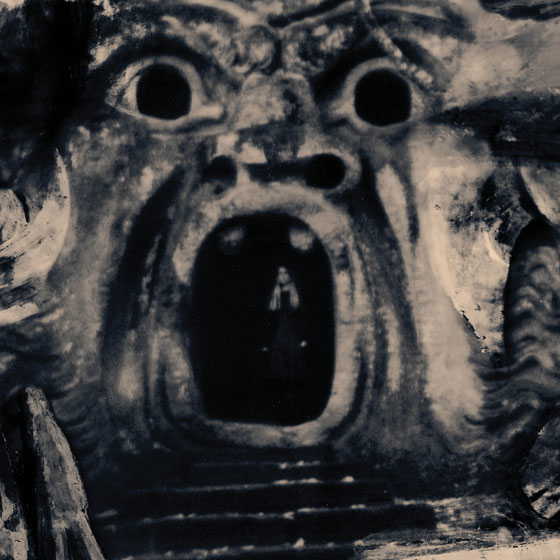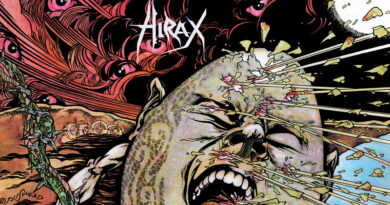Review: Anna Von Hausswolff ‘All Thoughts Fly’
When I first saw Anna von Hausswolff live, in the huge space of Tilburg’s 013 venue, what struck me most immediately was the sheer force of the sound. Not volume, although it was loud, but density. Every musician and instrument acting as a single layer of a combined, gestalt entity. When All Thoughts Fly was announced I have to admit to being slightly worried about how this density of sound would translate to an album created solely from a single instrument; the pipe organ.

Before we see if those worries are justified, though, let’s have a little history lesson. All Thoughts Fly is a translation of the Italian ‘ogni pensiero vola’ (sometimes translated as ‘all reason departs’). These words are inscribed on a statue of Orcus, the Roman god of the dark underworld that lies at the heart of the Gardens of Bomarzo in Lazio, Northern Italy. These gardens, known as Sacro Bosco (the Sacred Grove) were created by Pier Francesco Orsini, a 16th century mercenary captain, in remembrance of his wife Giulia Farnese. The twin translations of ‘ogni pensiero vola’ allude to the forgetfulness of the departed dead (Dante, a writer that Orsini would no doubt have read, describes how the sins and earthly cares of the dead are washed away into Hell by the river of Lethe) as well as the reason-shredding grief of those left behind. The phrase is double-edged, bittersweet; it reminds us that even the worst times will pass, eventually.
Thankfully, this is an idea that Anna von Hausswolff has captured immaculately. If I had a single word to describe this album then it would indeed be bittersweet. Sublime would be another, when taken in its original meaning of horror and elation blending into something far more intense than either. Perhaps I could use funereal, the wailing voices of the pipe organ acting as the howls of both the bereaved lamentations and lingering souls that flutter about, but cathartic is equally fitting.
It seems almost pointless to consider the tracks on All Thoughts Fly individually. They are nearer to movements within a single piece, one that tracks the process of mourning and sorrow. The gentle, arboreal overture of Theatre Of Nature leads into the harrowing Dolore Di Orsini (translated as ‘Orsini’s sorrow’) where a slow, fluting organ motif – hauntingly reminiscent of Sigur Ros’ more epic work – erupts into too-human shrieks and wails and then fades into the spectral warbles and mutters of Sacro Bosco.
slow, repeating organ phrases that layer over each other and bleed into the hushed, heaving breaths of the organ’s internal mechanisms…
Persefone brings some of her order, formal and processional, to proceedings before the more experimental blend of Entering and the album’s title track go full-on Philip Glass. It’s strange to call this minimalism as again, even despite the simplicity of the phrasing and layers, that density returns in a manner which suggests the layering of Pruit Igoe from Glass’ own Koyaanisqatsi masterpiece. Anyone looking for more traditionally song-based music might be confused and frustrated by these later tracks but their lineage can be clearly seen back through Hauswolff’s catalogue; The Marble Eye from Dead Magic could well be part of this album, as could the title track of 2015’s The Miraculous.
And then we come to the album’s final track. If All Thoughts Fly is indeed about the process of grief and loss then Outside The Gate (For Bruna) is the final stage of grieving; acceptance, even hope. The track uses the same elements as the rest of the album – slow, repeating organ phrases that layer over each other and bleed into the hushed, heaving breaths of the organ’s internal mechanisms – but it teases up threads of beauty rather than despair, the strange sense of euphoric relief that comes after floods of tears. In the faint melody that whistles up halfway through I can hear Nine Inch Nails’ A Warm Place but also the ghost of Beethoven’s Moonlight Sonata.
This is not an album for everyone. It’s not a fun album. In many ways it’s not an angry album, even though it deals with loss and pain. It’s an album for staring at the rain, for looking through old photographs. It’s an album for everything, everyone we’ve ever lost.
It’s an album about death and dying, but also about very much about living in the meantime.
It’s a quite beautiful album.
Label: Southern Lord
Band Links: Facebook | Bandcamp | Twitter | Instagram
Scribed by: Daniel Pietersen


